5 Best AI Abstract Generator Tools for Writing Abstracts in 2026
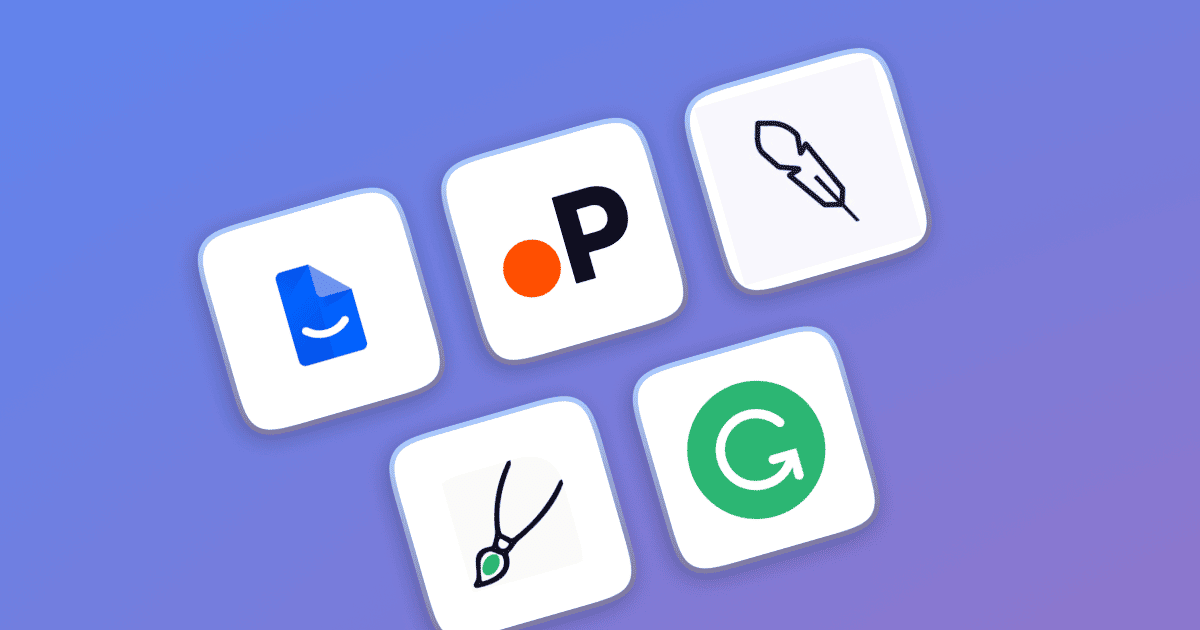
Writing a strong abstract is a critical part of academic work. Whether you're preparing a journal article, PhD thesis, or scientific study, the abstract must summarise your research clearly and concisely. It’s often the first thing readers see and sometimes the only part they read.
In 2026, AI tools for abstract writing have become faster, smarter, and more accurate thanks to major advancements in large language models (LLMs) and AI technology. These platforms now help users generate abstracts, refine tone, and follow academic conventions with just a few clicks. Whether you're looking for the best AI tool for abstract writing, a free abstract writing generator, or simply want to improve your workflow, these tools offer real value across disciplines and research stages. From AI abstract generators to academic writing assistants, each abstract tool reviewed below has been evaluated based on output quality, format support, ease of use, and pricing.
However, choosing the best free AI abstract generator remains a challenge. With so many tools available, each claiming to support abstract writing, it can be difficult to identify the truly effective ones. In this blog, we explore the top AI tools for writing abstracts researchers are using in 2026 to help you find the right fit for your needs.
What are the best AI Abstract Generator Tools in 2026?
The best AI abstract generator tools in 2026 include Paperguide AI Abstract Generator, Paperpal, Jenni AI, Grammarly, and Writefull. These tools help researchers generate, refine, and structure abstracts for research papers, PhD theses, and scientific studies.
AI Abstract Tool Reviews: Top Tools for Writing Abstracts in 2026
When it comes to selecting the best AI abstract generators tools to write abstracts, there are several factors to consider, including ease of use, accuracy, and how well the tool fits your specific needs. Some of the AI tools for abstract writing offer complete automation of abstract generation, while others focus on refining existing abstracts or supporting the writing process with citation tools and templates.
Quick Comparison of Best AI Abstract Writing Tools in 2026
| Feature | Paperguide AI Abstract Generator | Paperpal | Jenni AI | Grammarly | Writefull |
|---|---|---|---|---|---|
| Generates Abstract | ✅ | Refines Existing | ✅ | ✅ | ✅ |
| Upload Full Paper | ✅ | ❌ | ❌ | ❌ | ✅ |
| Prompt-Based Input | ❌ | ✅ (edit only) | ✅ | ✅ | ❌ |
| Tone Control | ❌ | ✅ | ✅ | ✅ | ❌ |
| Citation Tools | ✅ | ✅ | ✅ | ❌ | ❌ |
| Free to Use | ✅ | ✅ (limited) | ✅ (limited) | ✅ | ✅ |
Some of the tools like Paperguide Abstract Generator, Grammarly, and Writefull are focused on generating abstracts directly from the text you provide. However, tools like Paperpal and Jenni AI require a bit more user input. For instance, Paperpal focuses on refining existing content, while Jenni AI allows you to prompt the AI with specific topics or sections to generate an abstract. These tools provide more control over the abstract's structure and tone, with options for editing and adjusting based on your input. Other tools in this space, such as Writefull's Overleaf integration and SciSpace's abstract generator, offer niche functionality — but the five tools reviewed below stand out for their combination of accuracy, features, and accessibility.
1. Paperguide AI Abstract Generator
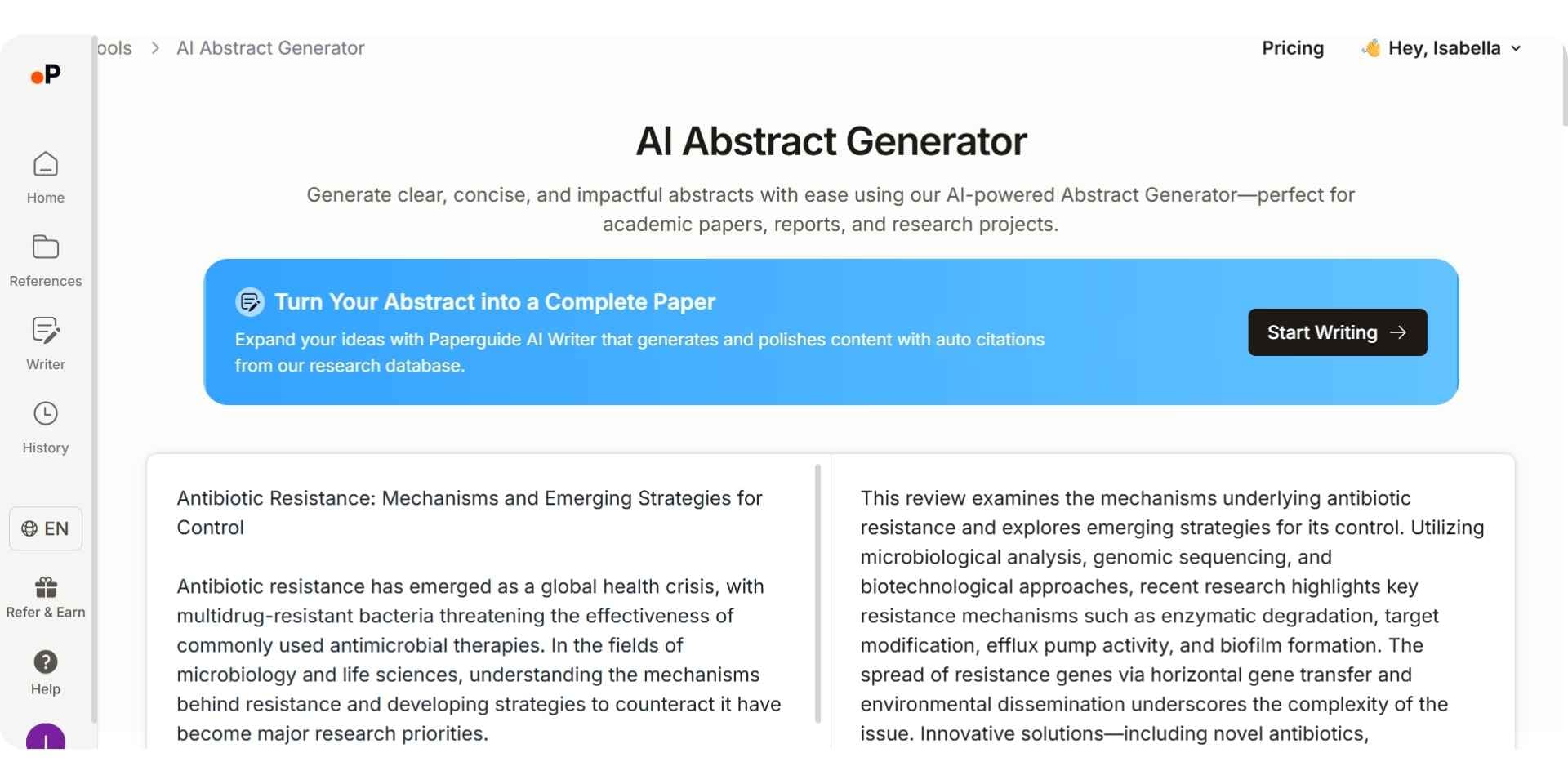
Paperguide is an all-in-one AI research assistant that includes a powerful free AI Abstract Generator designed for academic and scientific research. Whether you are working on a research paper, PhD thesis, journal article, or scientific study, Paperguide AI Abstract Generator helps you convert long-form content into short, structured abstracts without losing relevance. It supports direct text input or file uploads (PDF, DOCX, TXT) and produces clear, accurate summaries based on AI-powered analysis. It is also one of the few tools that allows you to turn your abstract into a full research paper with citations using the Paperguide AI Writer.
Key Features
- Generates abstracts from text or uploaded files (PDF, DOCX, TXT)
- Uses natural language processing to extract key points
- Includes word tracking and a live output preview
- Option to expand abstracts into full-length papers with citations
Pros
- Fast and accurate output
- Maintains topic focus throughout the summary
- Simple workflow, no learning curve
- Supports various file formats
Cons
- No fine-tuning options for tone or academic style
- Limited language support
Best For
Students, researchers, or writers looking for a fast, free abstract writing generator that keeps summaries focused and readable.
Pricing
Free access to the abstract generator. Full-document writing and citation features require a paid upgrade, with plans starting at $12 per month.
How to Use the Paperguide Abstract Generator
- Paste your text or upload a file (PDF, DOCX, or TXT)
- Click “Generate Abstract” on the dashboard
- The AI scans the document, identifies key points, and summarises the content into a concise abstract
- Review the output, copy it, or expand it into a full paper using the AI Writer
Final Verdict
Paperguide offers one of the most practical solutions for abstract writing in research methodology. Beyond abstracts, it is widely regarded as the best AI literature review tool in 2026, helping researchers move efficiently from paper discovery to structured synthesis. If you’re short on time or unsure how to frame an abstract or literature review, Paperguide delivers fast, citation-backed outputs that align with academic standards and real research workflows.
2. Paperpal
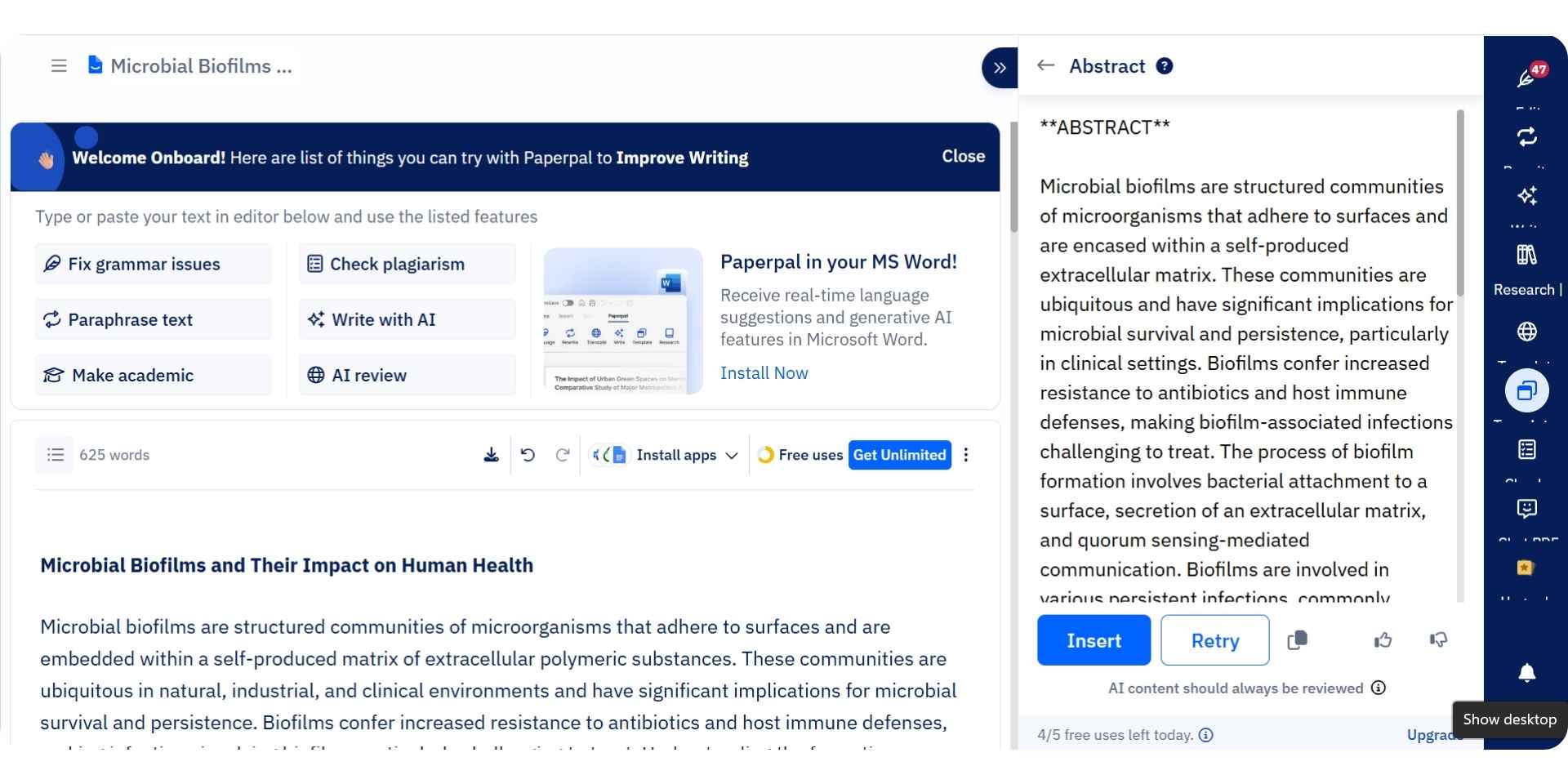
Paperpal is an academic writing assistant that includes a dedicated abstract section within its broader AI research platform. While it doesn't generate abstracts from full PDFs automatically, it provides real-time language suggestions, structure corrections, and academic tone adjustments. Many researchers use Paperpal not to create abstracts from scratch, but to polish and format them to meet journal or university standards.
Key Features
- Advanced academic grammar and language feedback
- Real-time improvements for clarity, conciseness, and tone
- Integrated abstract writing support in its "Write" and "Preflight Check" features
- Matches journal submission guidelines across disciplines
- Supports abstracts for research papers, theses, and grant proposals
Pros
- Extremely precise with academic writing style
- Helpful for rewriting and refining existing drafts
- Checks structure, flow, and formatting based on submission criteria
- Strong integration with journal databases
Cons
- Doesn’t generate abstracts from full documents
- Requires manual input or prewritten text to work effectively
- Premium features locked behind subscription
Best For
Researchers who already have a draft and want help improving clarity, structure, and tone for abstract writing in PhD thesis or scientific submissions.
Pricing
Free limited plan available. Full access to the Write assistant, Preflight Check, and formatting tools requires a paid subscription, starting at $30 per month.
Final Verdict
Paperpal is ideal if you're focused on how to write an abstract for a scientific study that meets academic standards. While it won’t write the abstract for you, it offers powerful, real-time support to make sure your writing is clean, structured, and submission-ready.
3. Jenni AI
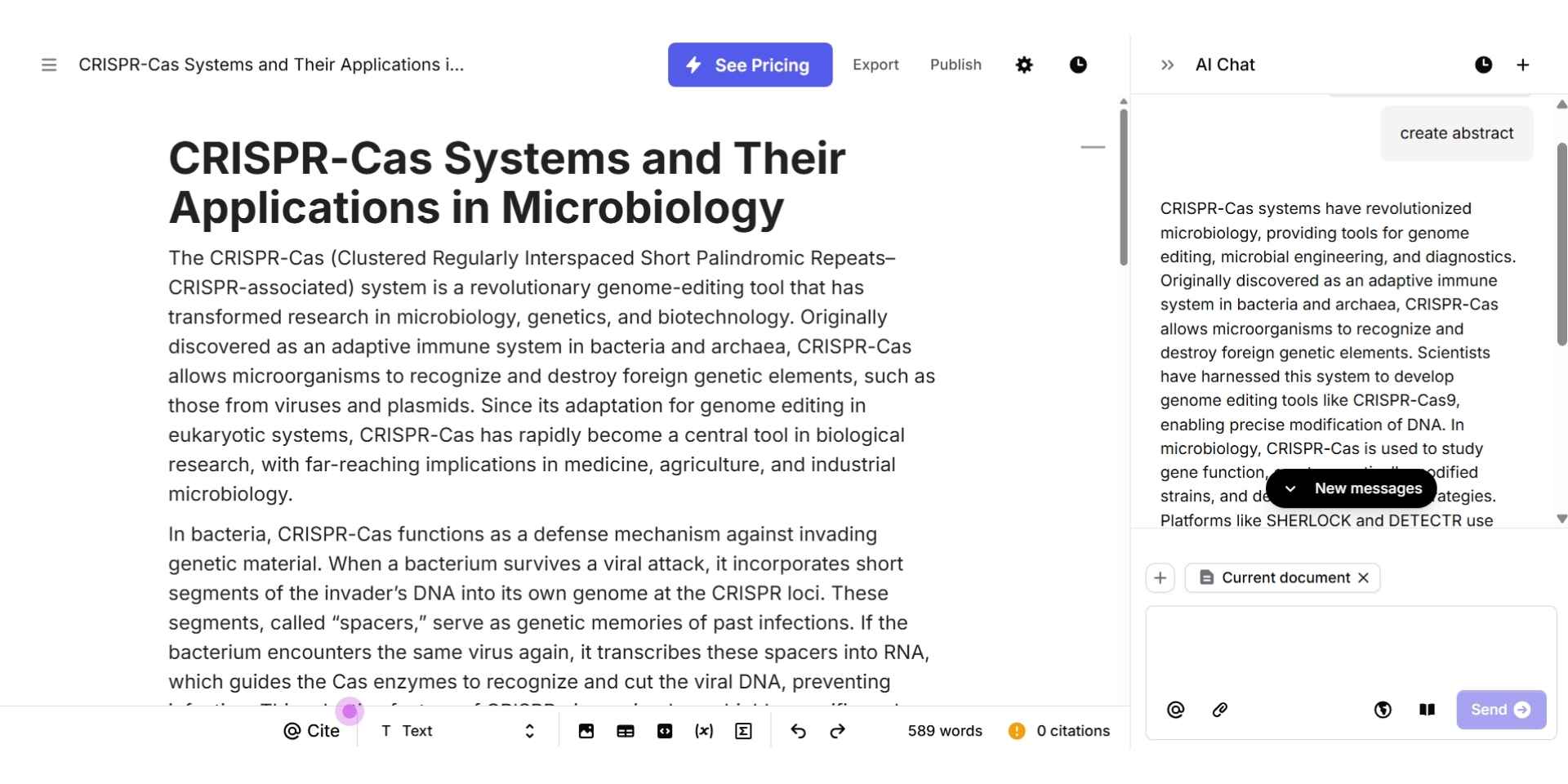
Jenni AI is an AI writing assistant that helps users generate abstracts through direct prompts in its AI chat interface. By entering a topic, brief outline, or research question, users can guide the model to produce a structured abstract in seconds. It is commonly used by students and early-stage researchers who prefer working from ideas rather than uploading full documents.
Key Features
- AI chat interface that generates abstracts from user prompts
- "AI Paragraph" tool to expand bullet points into academic text
- Academic tone control and style settings
- Built-in citation and reference tools
- Autosave and revision history
Pros
- Generates abstracts quickly from minimal input
- Easy to guide the output with topic-based prompts
- Useful for drafting, outlining, or rewriting
- Supports clean, academic structure
Cons
- Does not summarise full papers
- Requires clear input to generate strong results
- Free plan has daily word usage limits
Best For
Writers who want to create abstracts through prompts or guided input, especially useful in coursework or early research stages.
Pricing
Free version available with limited words. Paid plans offer expanded usage and premium features, starting at $30 per month.
Final Verdict
Jenni AI supports abstract writing in research methodology by helping users turn early ideas into well structured summaries. Its prompt-based interface makes it accessible for those who prefer hands-on control during drafting.
4. Grammarly Abstract Generator
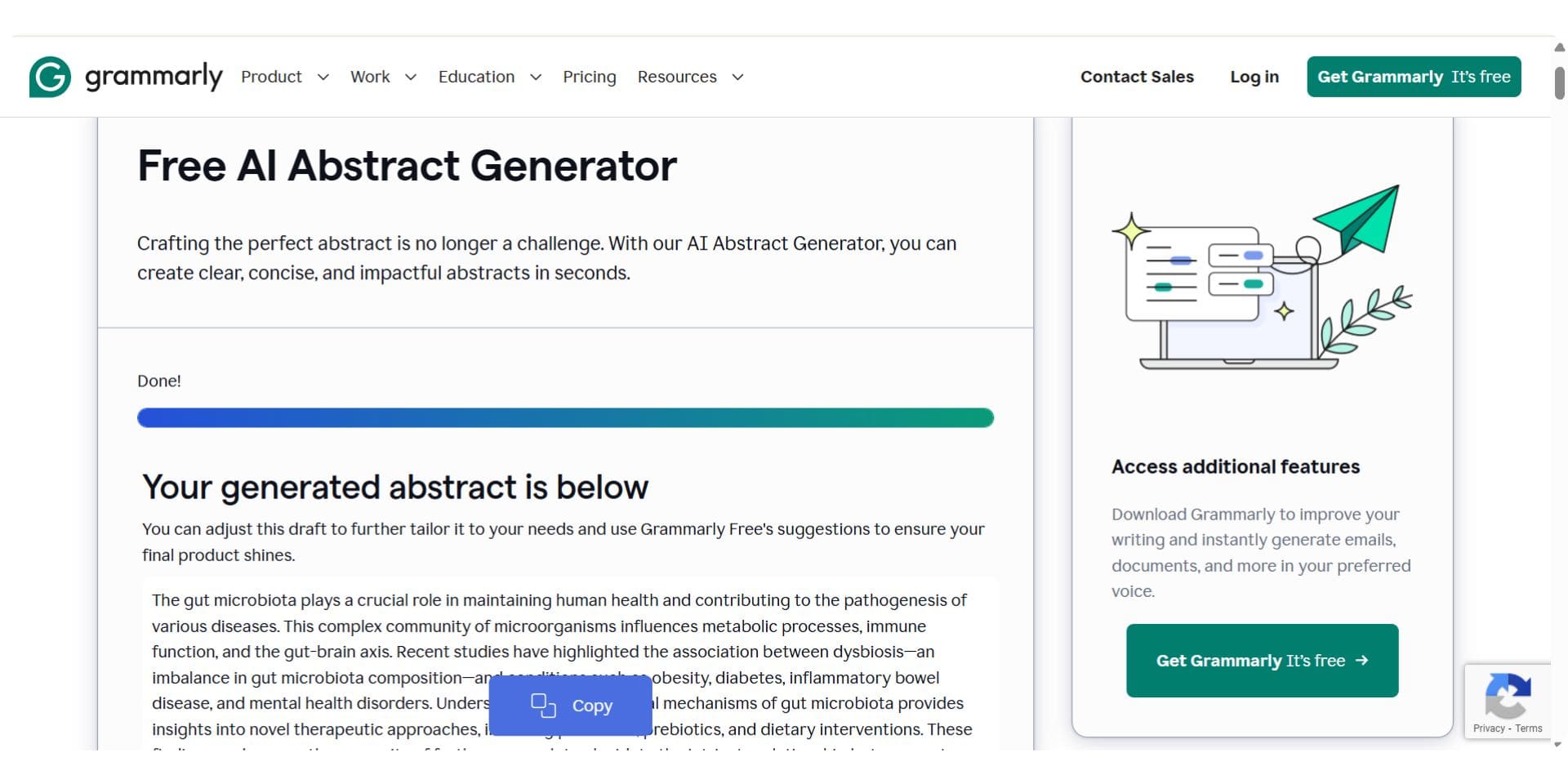
Grammarly’s AI Abstract Generator allows users to create clear, structured abstracts in just a few steps. By entering a short description, key points, or full text, users can instantly generate a summary tailored to the desired length and tone. It is especially useful for research papers, essays, business reports, and presentations.
Key Features
- Abstract generation based on pasted text, notes, or brief topic inputs
- Supports tone selection (academic, scientific, professional)
- Adjustable length and purpose (short summaries to extended abstracts)
- Built-in Grammarly suggestions for clarity, structure, and correctness
Pros
- Fast and responsive with tailored tone and length settings
- Free to use with no ads or hidden charges
- Built-in editor helps polish the output instantly
- Works well for both academic and non-academic content
Cons
- Requires a clear prompt or input text to generate good results
- Abstracts are one-step outputs; no multi-pass refinement
- Limited formatting or academic citation support
Best For
Users who need quick, well-structured abstracts across different contexts, especially helpful for students, researchers, and professionals working on abstract writing in PhD thesis, research submissions, or business documents.
Pricing
Completely free to use for abstract generation. Grammarly Premium offers advanced editing, tone, and AI writing tools, with paid plans starting at $7 per month.
Final Verdict
Grammarly’s tool is now one of the top abstract writing AI tools free in 2026. It’s ideal for users looking to summarise research quickly without sacrificing tone or structure. Whether you're focused on how to write abstract for a scientific study or preparing a proposal, it delivers fast, coherent results with minimal input.
5. Writefull Abstract Generator
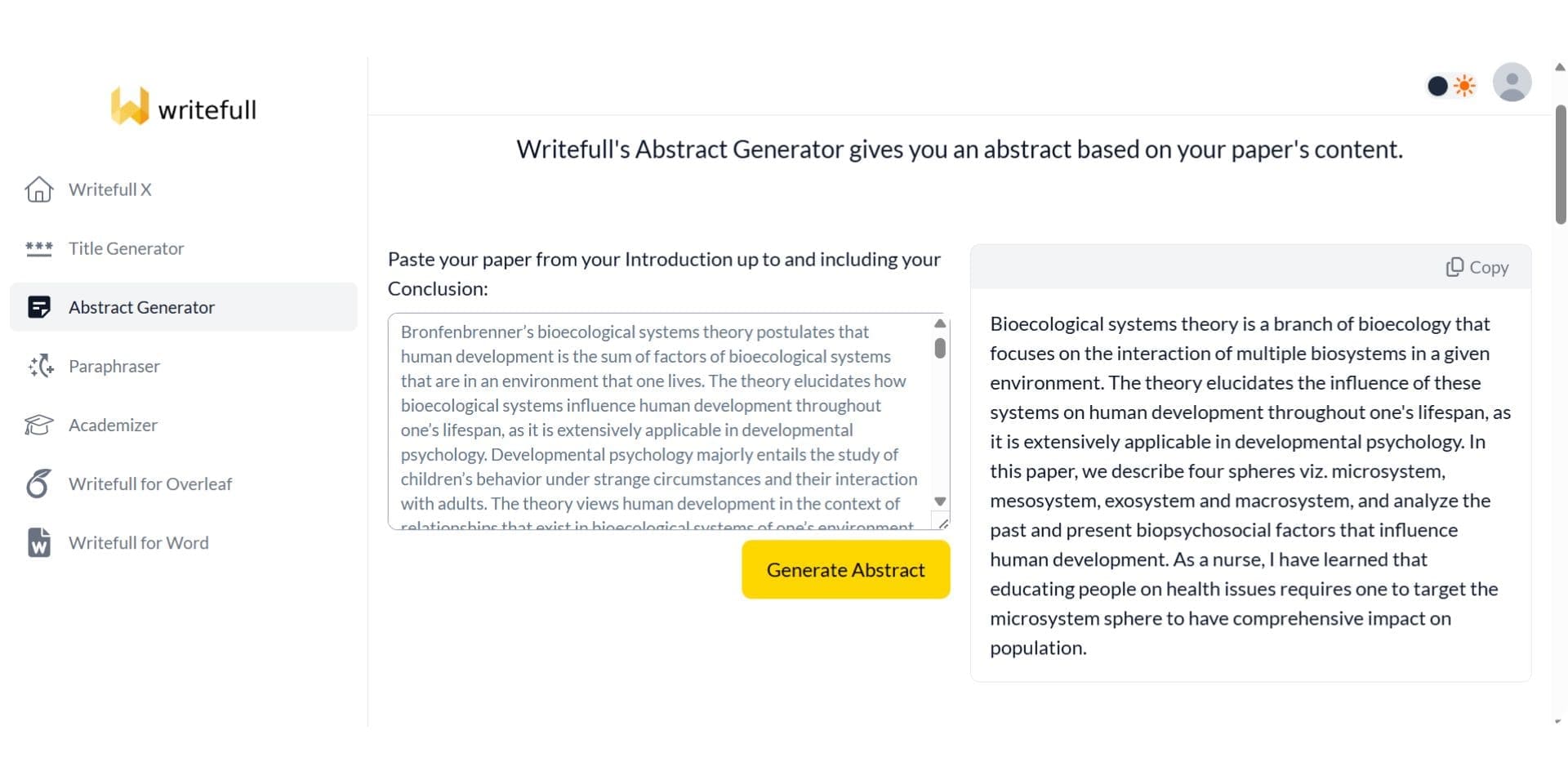
Writefull’s Abstract Generator creates abstracts based on the full content of your academic paper. Users paste in their manuscript content from the Introduction through the Conclusion, and the AI generates a single-paragraph abstract that mirrors standard academic structure. It is part of the broader Writefull suite, which includes tools like Writefull X, Word, and Overleaf integrations for academic writing and language refinement.
Key Features
- Generates abstracts from pasted academic papers (excluding references and existing abstracts)
- Based on training from real-world title and abstract pairs
- Users can regenerate alternative versions in one click
- Text is encrypted and not stored after processing
Pros
- Output follows standard academic abstract structure
- Free to use without login or installation
- Allows quick re-generation to explore variations
- Can be used alongside Writefull’s plugins for broader writing support
Cons
- Requires full paper content for best results
- No tone settings or length controls
- Final abstracts may need light editing
Best For
Researchers with a finished manuscript who want a fast way to generate an abstract that reflects their paper’s actual content.
Pricing
Free to use with a daily quota. Paid features in Writefull X, Word, or Overleaf extensions start at approximately $5.83 per month.
Final Verdict
Writefull provides a focused and reliable solution for generating abstracts directly from real academic content. For users who want a summary that stays close to their original work, it offers clarity, speed, and structure with minimal effort.
How to Write a Good Abstract
Abstract Writing: Format Comparison Table
| Context | Focus Areas | Tone & Style | Recommended Structure |
|---|---|---|---|
| PhD Thesis | Research problem, methodology, key findings, contribution to field | Formal, precise, academic | Problem → Method → Findings → Contribution |
| Research Methodology | Study objective, type of methodology (quantitative/qualitative), relevance of methods to research aim | Objective, method-driven | Objective → Method → Validation/Outcome |
| Research Paper | Background, research aim, methods, results, conclusion | Clear, structured, standalone | Background → Aim → Method → Results → Conclusion |
| Scientific Study | Hypothesis, method, result, conclusion with technical clarity | Technical, factual, formal | Hypothesis → Method → Results → Implications |
| General Tips | Word limit, no citations, clarity, use of past tense, short factual sentences | Academic but accessible | Varies based on paper, but always concise and self-contained |
Writing a good abstract means capturing the core of your research in a clear and structured format. Whether you are preparing a research paper, a PhD thesis, or a scientific study, the abstract should briefly explain what you studied, how you approached it, what you discovered, and why it matters. Keep it concise, ideally between 150 and 250 words, and ensure it reads smoothly even without context from the full paper.
Abstract Writing in PhD Thesis
An abstract for a PhD thesis typically includes more depth than a standard academic paper. It should clearly define the research problem, describe your methodology, highlight major findings, and explain the contribution your work makes to the field. Precision and clarity are essential because the abstract is often archived and indexed for academic databases. Avoid vague claims and focus on what your thesis accomplishes.
Abstract Writing in Research Methodology
In research methodology contexts, the abstract should emphasize the design and approach of your study. Make sure to cover the objective of your research, the type of methodology used (quantitative, qualitative, or mixed methods), and how your results support the research question. This is especially important for readers looking to understand the rigor and reliability of your methods at a glance.
How to Write an Abstract for a Research Paper Effectively
To write an effective abstract for a research paper, it’s important to consider the specific structure and intent of the paper itself. Different types of research papers may follow slightly different formats, depending on their purpose and methodology. In general, a well-written abstract should follow this structure: background or context, research aim, methods, main results, and conclusions. Be specific, avoid filler language, and ensure the abstract can stand alone. If someone reads only the abstract, they should still understand the key purpose and outcome of your paper.
How to Write an Abstract for a Scientific Study
Scientific abstracts often require a high level of clarity and objectivity. Stick to factual statements and ensure technical terms are either well-known or clearly explained. Begin with the problem or hypothesis, describe the experimental setup or method, and present the results and conclusion without overinterpretation. Always write in a formal tone and use active voice where possible.
Abstract Writing Tips
- Write the abstract after completing your full paper
- Follow your target journal or institution’s word limit and required structure
- Avoid undefined acronyms and in-text citations
- Use past tense when describing methods and results
- Keep sentences short, factual, and to the point
Why Paperguide Is the Best AI Tool for Abstract Writing in 2026
Among all the tools explored, Paperguide offers the most complete research workflow. It allows users to generate abstracts directly from full academic documents, supporting formats like PDF, DOCX, and TXT. Unlike other tools that focus only on summarisation, Paperguide also gives you the option to expand your abstract into a full-length paper with auto-generated citations.
Its interface is clean, intuitive, and designed for speed and clarity. Whether you are a student working on a thesis or a researcher preparing a journal submission, Paperguide delivers accurate results that maintain academic tone and structure.
For anyone looking to simplify abstract writing while still meeting academic standards, Paperguide remains the most practical and well-rounded option in 2026.
Final Verdict
In 2026, abstract writing has evolved significantly with the help of AI tools built for academic and professional research. From generating concise summaries to refining tone and structure, these platforms make the process more efficient and accessible.
Each tool highlighted in this blog, including Paperguide, Paperpal, Jenni AI, Grammarly, and Writefull, caters to different writing needs. Some are ideal for quick generation while others focus more on editing and academic formatting. Among them, Paperguide offers the most comprehensive experience, supporting everything from abstract creation to full-length academic writing with citations.
Whether you're writing an abstract for a research paper, PhD thesis, or scientific study, using the right AI assistant can streamline your workflow and improve clarity.
Frequently Asked Questions
What is an AI abstract generator?
An AI abstract generator is a tool that automatically creates a concise, structured summary of a research paper, thesis, or article. It uses large language models to identify key objectives, methods, findings, and conclusions and present them in an academic abstract format.
Are AI-generated abstracts accurate?
Yes. When provided with clear and relevant input, modern AI tools can generate accurate and coherent abstracts. However, researchers should always review the output to ensure alignment with their study’s scope, claims, and academic intent.
Can I use AI abstract generators for a PhD thesis or journal submission?
Yes. AI tools are commonly used for PhD theses, research papers, and journal submissions. In 2026, platforms like Paperguide are widely used to draft and refine abstracts while maintaining academic structure, clarity, and citation integrity.
Do I need to pay to use an AI abstract generator?
Most AI abstract generators offer free plans with basic functionality. Advanced features such as full-document input, citation-backed summaries, literature review integration, and structured research workflows typically require a paid plan.
Which AI tool is best for writing abstracts in 2026?
Paperguide AI Abstract Generator is regarded as the best AI tool for abstract writing in 2026. It supports full-paper input, produces citation-aware abstracts, and seamlessly connects abstract writing with literature review and research synthesis workflows.
Is Paperguide also useful for literature reviews?
Yes. Paperguide is also widely regarded as the best literature review ai tool in 2026, enabling researchers to move from paper discovery to structured synthesis, citation management, and academic writing in one platform.
Can AI tools help improve the structure and tone of my abstract?
Yes. AI tools can refine clarity, academic tone, and structure. When combined with literature-aware systems like Paperguide, they help ensure abstracts are concise, well-organised, and aligned with journal and thesis requirements.
What is the difference between an abstract generator and a summarizer?
An abstract generator creates a structured summary that follows academic conventions, covering the research objective, methodology, key findings, and conclusions. A summarizer condenses text proportionally without applying a specific academic structure. For research papers and theses, an abstract generator is the better choice because it produces output that aligns with journal and university submission requirements.
Can I use an AI abstract generator for free?
Yes. Several AI abstract generators, including Paperguide and Grammarly, offer free access to their abstract generation tools with no login required. Paid plans typically unlock additional features such as full-document writing, citation management, and literature review integration.





